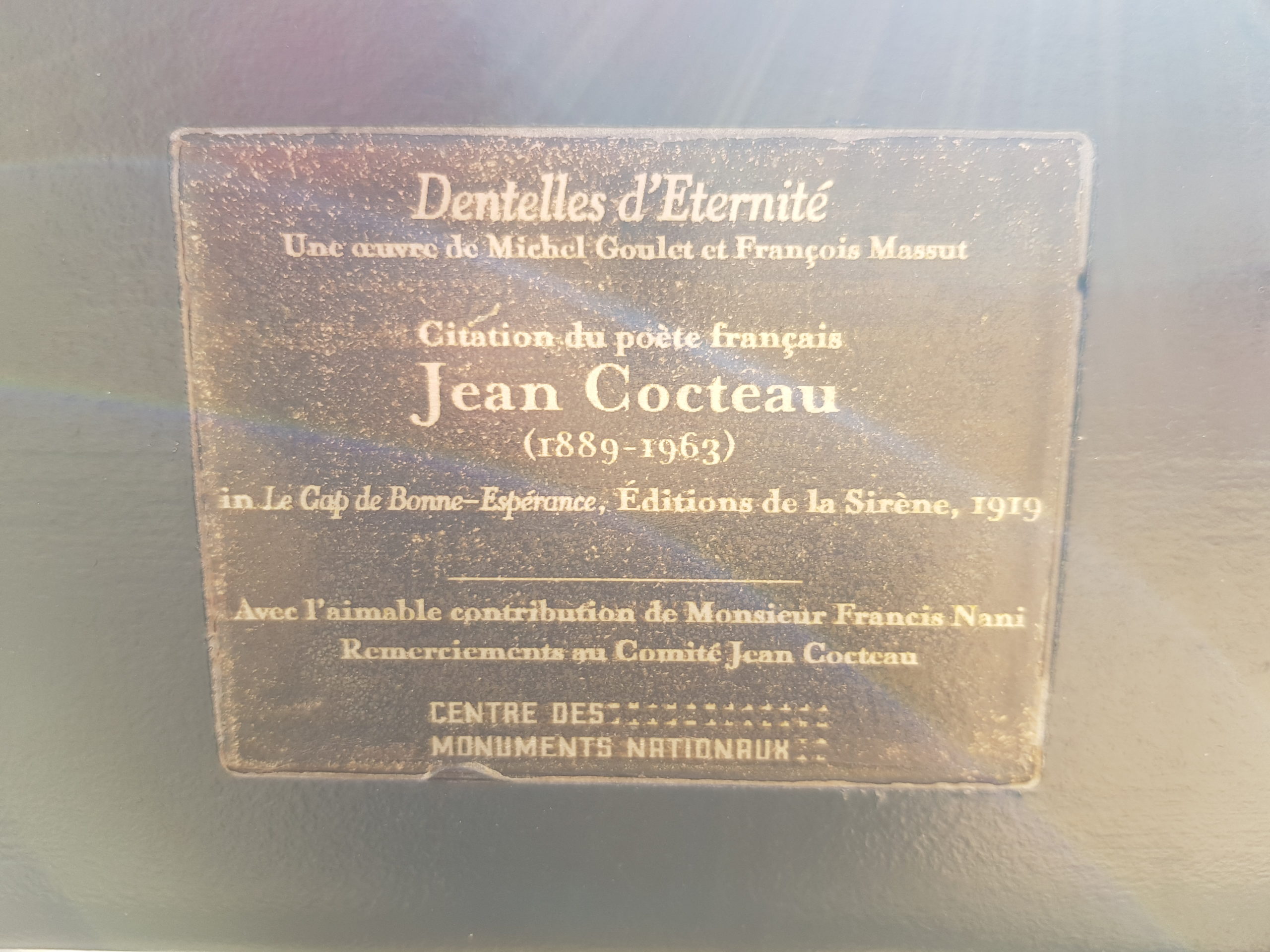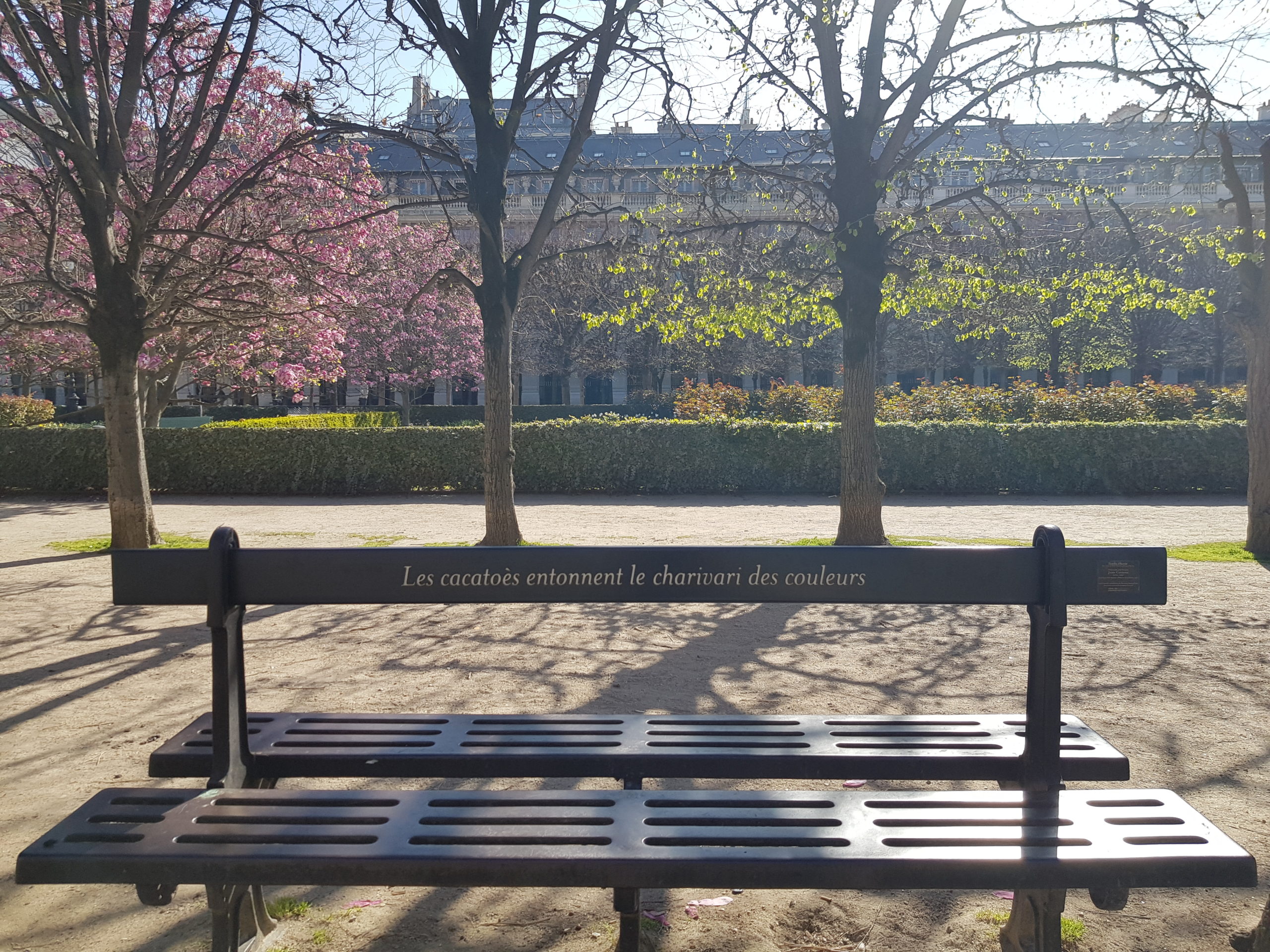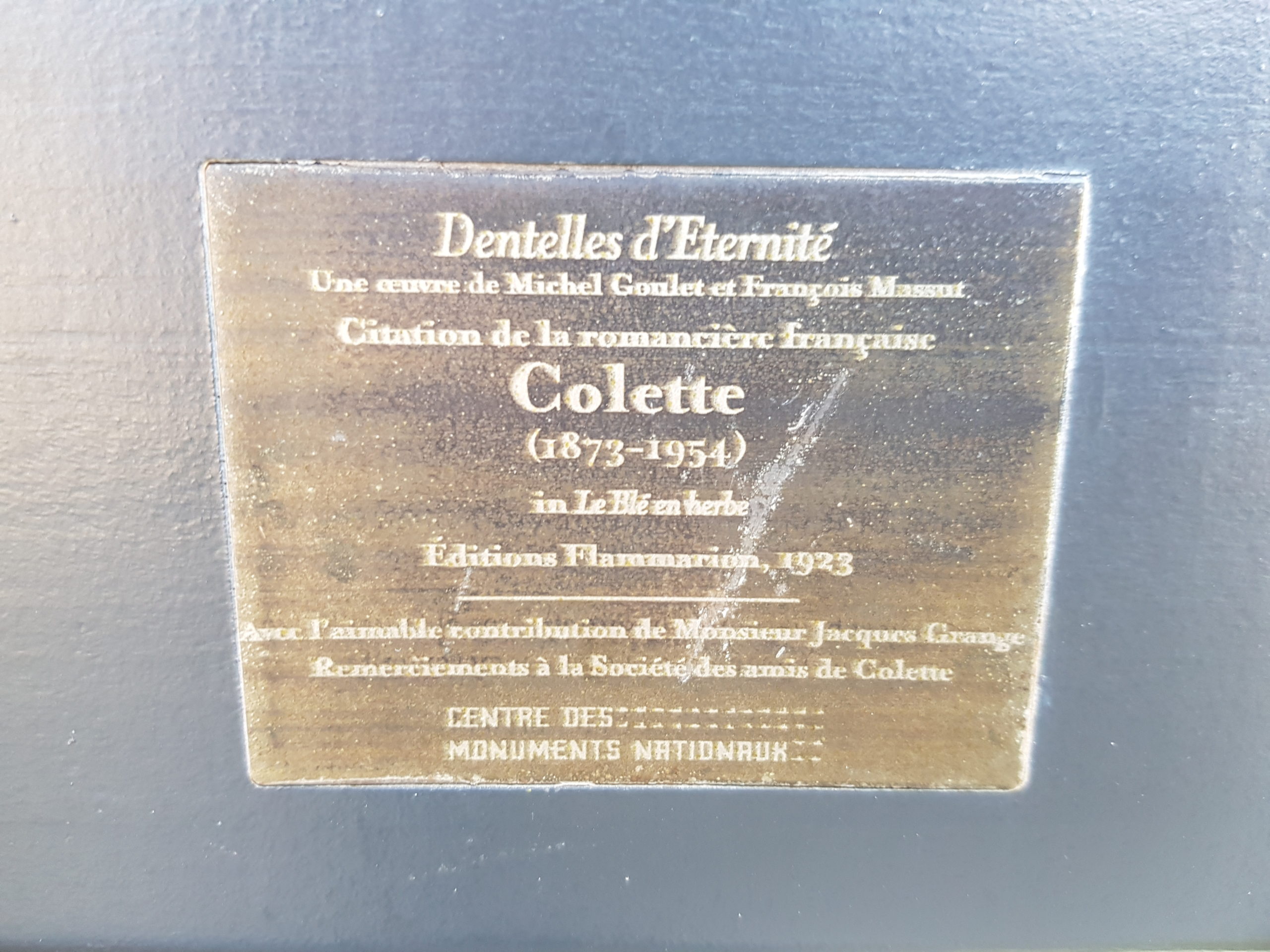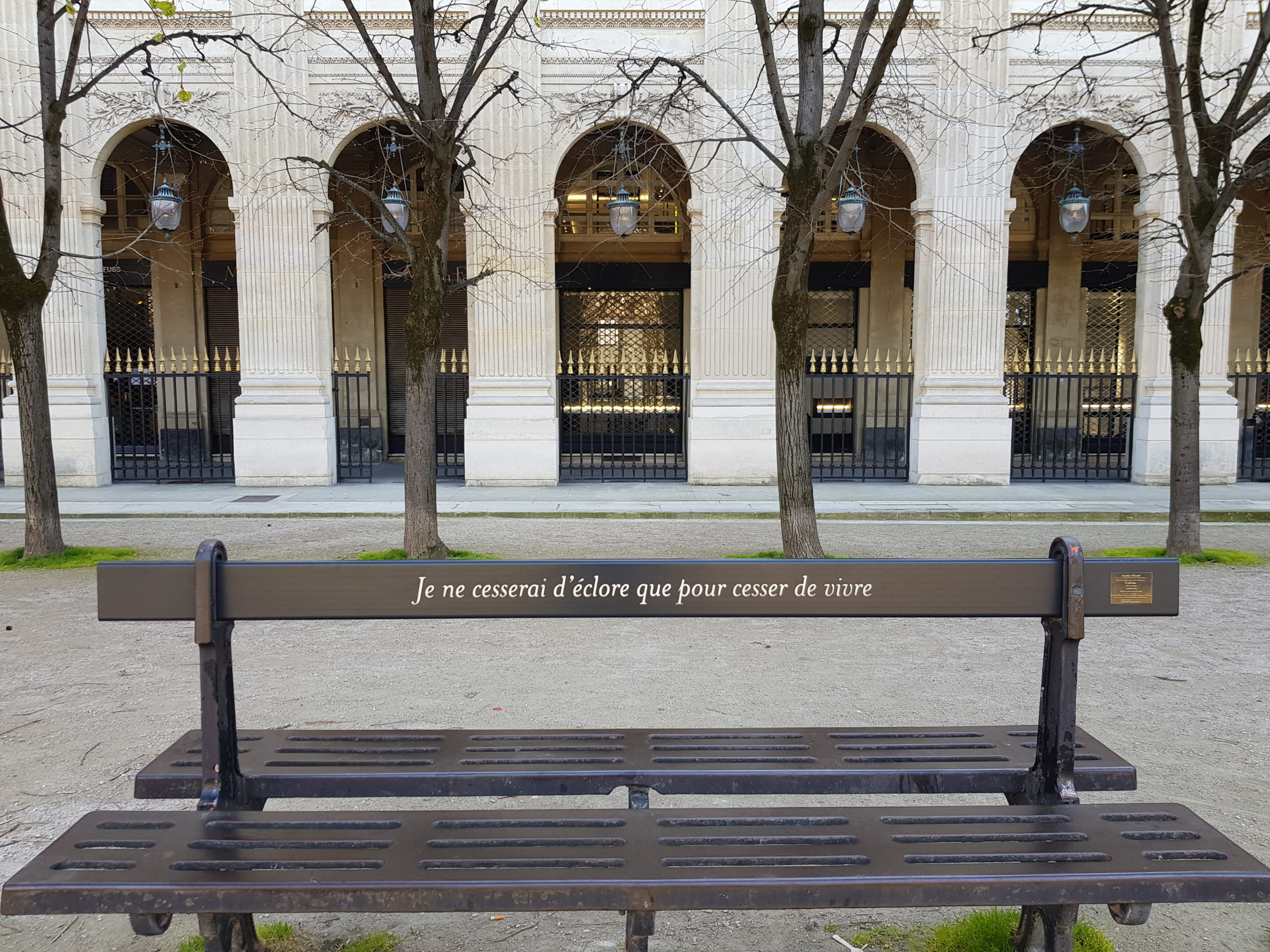Poetry paradise at the Palais Royal: Weekday wandering in Paris
What better way to spend a glorious spring morning than a short visit to the gardens at Palais Royal (1er arrondissement, métro Palais Royal-Musée du Louvre). One would hardly realise that thanks to Covid-19, we are in fact in our third confinement, albeit very relaxed, and as a consequence, I am able to go for a breezy stroll somewhere iconic, beautiful, and serene.
With the prospect of imminent stricter measures threatening to restrict our outdoor life, one must therefore make the most of moments such as these.

Palais Royal: Today’s challenge
Investigate and document the art installation Dentelles d’éternité by Michel Goulet (in association with François Massut). Eighteen of the 30 or so bench seats in the park feature poetic fragments, which, for the uninitiated such as me, beg the reader to read, reflect, and possibly research.
The park is cloistered within the Palais Royal, a perfectly elongated quadrangle of elegant 17th-century buildings. Along the central axis are two blocks of lawn and flower garden to the north and south, joined in the middle by a fountain with a large pool; the most striking features at present are the newly-flowering magnolia trees, which are a bold dark pink colouration. Along the flanks of this axis, to both the west and east are two tree-lined rows of double-sided park benches.
18 pairs of inscribed bench backrests
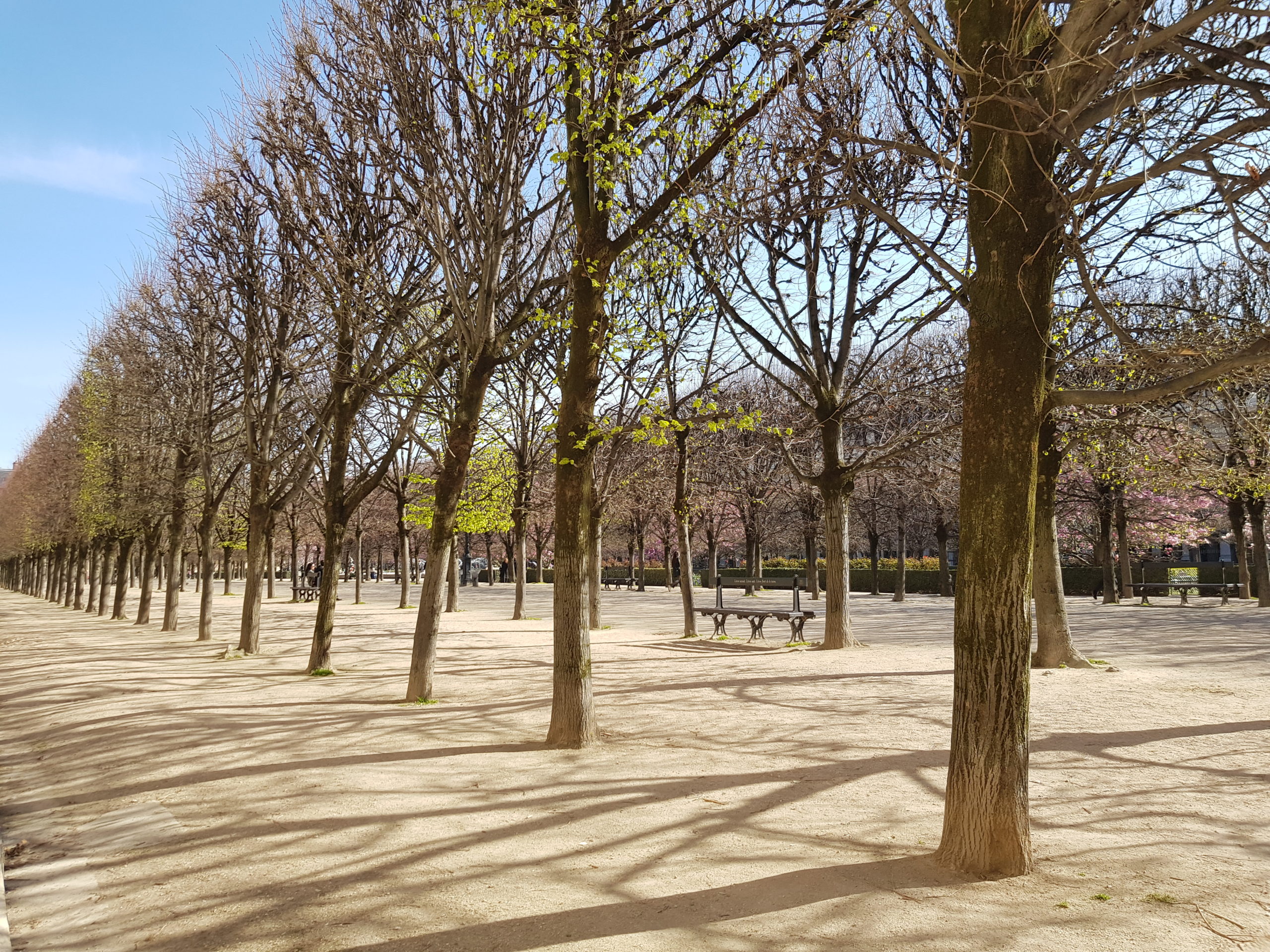
My mission is to photograph each of the 18 pairs of inscribed backrests. In pre-Covid times, this would have been near impossible, but as it is still mid-morning – the lunch crowd has not yet descended – most of the benches are free.
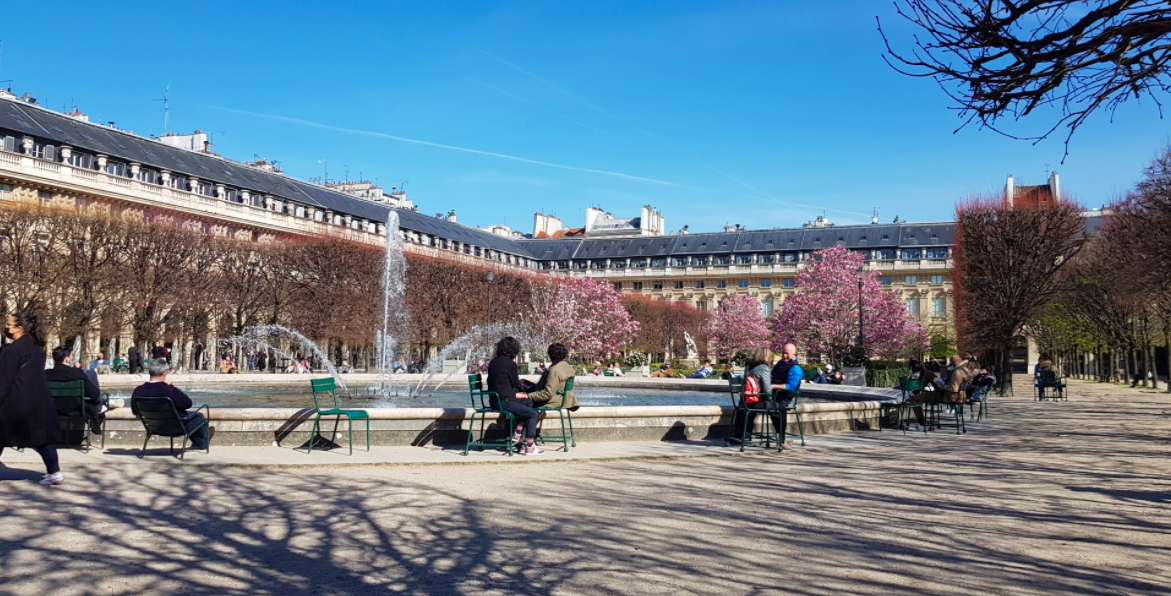
Noting here the two types of seating populating the park. There are double-sided benches and there are also individual green seats. The benches are fixed and the seats are able to be moved as preferred by the visitors.
- The majority of visitors are thus far positioned on the green seats around the pool. Some of these seats also feature a poetry project by Goulet, something to look into next time. As usual, the visitors are chatting, reading, or sunning themselves; others are walking their dogs or baby strollers, and yet more engaged in physical exercise of some sort (running, calisthenics, yoga… take your pick).
- At the northernmost end of the garden is a small sandpit enclosure where various nannies survey their charges.
- The arcades fringing the garden are shaded and lonely with most of the shops long-since closed and abandoned.
Poetry: To translate or not translate?
The two rows of double-sided benches have been named for celebrated French authors Jean Cocteau (1889-1963) and Sidonie-Gabrielle Colette (1873-1954): Allée Cocteau (to the west) and Allée Colette (to the east).
- The western row features quotes in the main from Cocteau, along with some other male writers.
- Likewise, the eastern row pays hommage to Colette and fellow female writers.
Feeling somewhat rushed in my task, I didn’t take the opportunity to enjoy each written sentiment in the way it was intended – unharried, in tranquil repose – but I did try to imagine what each might be saying.
It is one thing to translate directly from French to English, but as we know, much is lost in translation, particularly with the ethereal nature of poetry, and I am no expert. I am certainly not prepared to consider a deeper meaning without knowing the full context of each quote.
And so, my photographic haul has charged me with a quest to discover for myself more about these renowned writers and their works. And I hope you will do the same.
Palais Royal: 36 quotes, and sources
Here is a complete list of 36 quotes and their sources.
For those Parisians who have not yet seen these, I urge you to visit, if not for the poetry, then for the sheer beauty and calm that can be enjoyed in this magnificent space.
For those of you who have been prevented by current circumstances from coming to Paris, I can understand your grief, though I’m eternally grateful that this is now my home, happily ‘stuck’ here forever. While you wait to visit Paris again, perhaps you could read up on these excerpts, discover the complete works as well as the artists who produced them, so that when you return to Paris, you will be able to come to Palais Royal, sit down next to your favourite quote, and fully appreciate its significance.
And soon you can join us in our Weekday Wandering Walks in Paris with Jacqui, the author of this article, and other members, read more about it and watch Jacqui’s video below.
ALLÉ COCTEAU
Lèvre savait. Lèvre sait. Lèvre finit de la taire.
– Paul CELAN, A hauteur de Bouche, Choix des poèmes, Éditions Gallimard, 1998 (translated from German)
Le sommeil n’est plus un lieu sûr
– Jean COCTEAU, Opéra, Édition Stock, 1927
Perdre l’enfance, c’est perdre tout. C’est douter.
– Jean COCTEAU, Le Foyer des artistes, Éditions Plon, 1947
Nos morts ne s’envolent pas sinon en nous-même
– Paul-Marie LAPOINTE, Hibernations – Pour les âmes, Éditions de l’Hexagone, 1966
J’élabore dans les prairies du silence intérieur
– Jean COCTEAU, Le Cap de Bonne-Espérance, Éditions de la Sirène, 1919
Toute Pensée émet un Coup de Dés
– Stéphane MALLARMÉ, Un Coup de Dés jamais n’abolira le Hasard, Numéro 17 de la revue Cosmopolis 1897
Aujourd’hui, c’est demain et hier qui s’épousent
– Jean COCTEAU, Clair-Obscur, Éditions du Rocher 1954
Ma joie vient de la nouveauté de mon émotion
– César VALLEJO, Découverte de la vie, Poésie complète : 1919-1937, (translated from Spanish)
C’est moi qui fais le bruit des vagues
– Jean COCTEAU, Féerie– Poésies (1917-1920), Éditions de la Sirène, 1920
LA MORT EST UNE LETTRE QUI N’A JAMAIS ÉTÉ ÉXPÉDIÉE
– Allen GINSBERG, Kaddish, Christian Bourgeois éditeur, 2005, (translated from English)
Un arbre secoué par le rire lâche ses fruits et ses oiseaux
– Jean COCTEAU, Discours de réception à l’Académie Française, 20 October 1955
Je m’écorche aux cristaux qui dansent dans mon corps
– Roger GILBERT-LECOMTE, La Vie, l’Amour, la Mort, le Vide et le Vent, Éditions des Cahiers libres, 1933
Les cacatoès entonnent le charivari des couleurs
– Jean COCTEAU, Le Cap de Bonne-Espérance, Éditions de la Sirène, 1919
La rue contient sa douleur en silence
Vladimir MAÏAKOVSKI, Le nuage en pantalon, Le Temps des Cerises éditeurs, 1997 (translated from Russian)
Un secret a toujours la forme d’une oreille
– Jean COCTEAU, Le Rappel à l’ordre, Éditions Stock, 1926
Et glisse entre nous crisse le silence craque
– Bernard Heidsieck, Poème-Partition « Q » – les Tapuscrits, Éditions Les presses du réel/Villa Arson, 2013
Le sens est le seul feu invisible qui nous consume
– Tristan TZARA, L’Homme approximatif – Poésies complètes, Éditions Flammarion, 2011
Je dis : L’art meut l’arme des larmes
Jean COCTEAU, Opéra, Éditions Stock, 1927
ALLÉ COLETTE
Le plus sûr moyen de rajeunir, c’est de croire au merveilleux
– COLETTE, Lettre à Françoise Ducharne, 1925
Puisse au loin recouler la colombe de la prison
– Anna AKHMATOVA, L’églantier fleurit et autres poèmes, Éditions La Dogana, 2010 (translated from Russian)
Nous ne regardons jamais assez, jamais assez juste, jamais assez passionnément
– COLETTE, Paris de ma fenêtre, Éditions du Milieu du monde, 1944
Tu manges le souvenir avec la cuillère de l’oubli
– Hilde DOMIN, Avec un si léger bagage, Éditions L’Oreille du Loup, 2010
Je ne cesserai d’éclore que pour cesser de vivre
– COLETTE, Le Blé en herbe, Éditions Flammarion, 1923
La fragilité épuisée prendra les armes pour seulement défendre son intimité
– Josée YVON, Filles-commandos bandées, Éditions Les Herbes rouges, 1976
Nous sondons le vide et l’onde en quête du sens perdu
– Andrée CHEDID, Par-delà les mots, Éditions Flammarion, 1995
Faites des bêtises, mais faites-les avec enthousiasme
– COLETTE, Lettre à sa fille (1913-1953), Éditions Gallimard, 2003
Il faut avec les mots de tout le monde écrire comme personne
– COLETTE, La Retraite sentimentale, Éditions Mercure de France, 1907
Je suis cette demeure hantée par un cri
– Sylvia PLATH, Ariel, Éditions Gallimard, 2009 (translated from English)
S’étonner est un des plus sûrs moyens de ne pas vieillir trop vite
– COLETTE, Discours de réception à l’Académie royale de langue et de littérature françaises de Belgique, 1936
Elle meurt de mort lointaine l’amoureuse du vent
– Alejandra PIZARNIK, Les travaux et les nuits, Éditions Granit/UNESCO, 1986 (translated from Spanish)
Le difficile ce n’est pas de donner, c’est de ne pas tout donner
– COLETTE, La naissance du jour, Éditions Flammarion, 1928
Respiration : les lèvres comme unique fragmentation
– Anne-Marie ALBIACH, Cinq les chœur – Œuvres/ 1966-2012, Éditions Flammarion, 2014
Tendre vers l’achevé, c’est revenir à son point de départ
– COLETTE, Discours de réception à l’Académie royale de langue et de littérature françaises de Belgique, 1936
Je fuis. Chaque jour, je prends la forme d’un départ.
– Danielle COLLOBERT, Œuvres I, P.O.L. éditeur, 2004
Ce lieu déborde la vie, surtout à la pointe du jour et au coucher des oiseaux
– COLETTE, La naissance du jour, Éditions Flammarion, 1928
Dors-tu, ma vie ! ou rêves-tu de moi ?
– Marceline DESBORDES VALMORE, Dors-tu-Les Pleurs, Librairie de Charpentier, 1833
We have great pleasure in announcing our Weekday Wandering Walks in Paris, where members take us to their favourite haunts in Paris – what better way to discover Paris beyond the cliché. Jacqui is helping me put together the first of these. Click here http://bit.ly/WeekdayWandering to access Jacqui’s video in the Palais-Royal. If you are interested to know about our launch and/or if you are interested to participate in Paris or elsewhere in France. Please let us know by answering these 3 questions on this form.
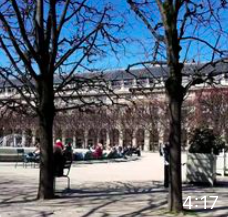
How well do you know the Palais Royal? Did you know about the poetry fragments? Please share your thoughts and experiences with us in Comments below.
Image credits: all images copyright Jacqueline Luquin, the author

